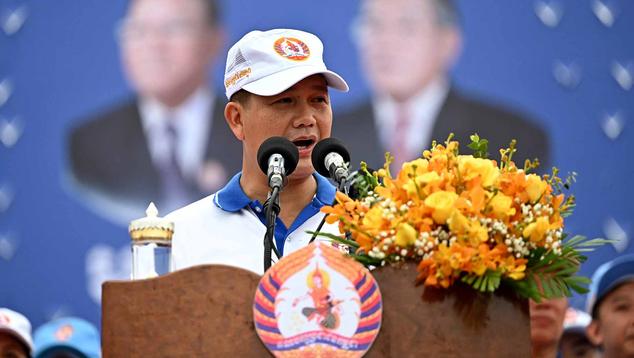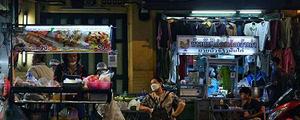Story Highlights
- More than eight in 10 confident in banks, military
- Almost universal satisfaction with quality of education
- Majority still struggling to afford food
WASHINGTON, D.C. -- After 38 years in power, Prime Minister Hun Sen -- one of the longest-serving leaders in the world -- is passing the baton to his eldest son, Hun Manet.
The transfer of power, which officially takes place on Aug. 22, comes on the heels of the ruling Cambodian People’s Party (CPP) landslide victory in an uncompetitive election last month.
Gallup data show that in many ways, Hun Manet is inheriting a relatively stable country where confidence in several institutions -- such as the military and financial institutions (each at 82%) -- runs high, but inequality does too.
Quick Summary: Hun Sen’s rule has spanned generations. He first came to power in 1985 under a communist regime installed by Vietnam and remained there under a United Nations-led multi-party democratic system after the Paris Peace Agreements in the early 1990s. Hun Sen lost the first election he contested in 1993 but seized power in a 1997 coup. His party, the CPP, has won every election since.
Much of Hun Sen’s political legitimacy lies in his claim to have delivered peace and prosperity to Cambodia after years under the rule of Pol Pot and the Khmer Rouge. Cambodia has been one of the world’s fastest-growing economies this century, albeit starting from a low base. However, Hun Sen has been widely criticized for becoming increasingly authoritarian.
Hun Manet’s succession represents the first change in political leadership for generations. He has long been in line for power after years of leading the army but has never held high political office. Commentators debate whether Hun Manet -- educated in the United Kingdom and a former member of a U.S. military academy -- will follow his father’s leadership example or forge closer ties to the West.
Cambodians Confident in Several Institutions: While Gallup has not been able to field certain politically sensitive questions in Cambodia since 2017 -- such as leadership approval or confidence in the national government and judicial system -- Cambodians’ confidence is high in a number of other institutions. For example, confidence in Cambodia’s financial institutions has been high -- and relatively stable -- for over a decade. In 2022, four in five Cambodians (82%) expressed faith in their banks and financial institutions.
This is in line with the median for confidence in financial institutions in Southeast Asia, even though Cambodia scores near the bottom for GDP per capita in the region, ahead of only Myanmar.
Faith in the Cambodian military tells a similar story, with confidence standing at 82%. For most years since Gallup started tracking confidence in Cambodian institutions in 2006, older Cambodians have had far higher levels of confidence in the military than younger generations. But this gap has narrowed in recent years. Cambodians younger than 30 now have a similar level of confidence in the military as those aged 50 and older (82% vs. 87%, respectively).
Widespread Satisfaction With Infrastructure and Key Services: Cambodia has seen dramatic improvements in healthcare and education over the past several decades. Between the first year that Gallup surveyed Cambodia in 2006 and today, life expectancy has increased from 65 to 70.
In 2006, 41% of Cambodians reported having health problems that kept them from doing activities people their age normally do, by far the highest level in the region. By 2022, this had fallen to 29%. While still among the highest in the region, the gap has narrowed dramatically. The prevalence of health problems is now on par with Thailand, Laos and Myanmar.
The vast majority of Cambodians (93%) are satisfied with the quality of their education system and schools. According to the World Bank, literacy rates have risen from 67% in 1998 to 84% in 2021.
Cambodia’s media landscape has also shifted dramatically in recent years. In 2017, only a third (33%) had a mobile phone that could access the internet. This rose to 77% in 2022, driven by significant increases among all age groups, including those younger than 30, at 92%. As Hun Sen has cracked down on traditional media outlets in the country, political discourse and news consumption has increased on social media. Hun Sen recently returned to Facebook -- where he has millions of followers -- after being accused of inciting violence against his political opponents, prompting an oversight board to consider suspending his accounts for six months.
Economic Challenges Persist: More Cambodians believe their living standards are getting better than worse (47% vs. 27%), yet they are relatively pessimistic compared with other populations in Southeast Asia.
Between 2009 and 2019, Cambodia’s economy grew at an impressive 7% each year. As a result, the poverty rate almost halved, falling from 34% to 18%. But Gallup data on people’s ability to afford food and get by on their household income show there is a long way to go on Cambodia’s road to prosperity.
The percentage of Cambodians struggling to afford food has fallen from its height of 72% in 2013 but remains persistently high at 58%. Among the poorest 20% of society, the inability to afford food reached a record high of 87% last year. In no other country in the world is there greater inequality between the rich and poor in their ability to afford food.
Further, only 6% of Cambodians felt they were living comfortably on their income in 2022 -- tied with Laos (5%) as the lowest in Southeast Asia. Since then, inflation has tumbled from 8% to below 1% in 2023, which should alleviate the pressures on household incomes this year.
Bottom Line
In many ways, the Cambodia that Hun Manet is inheriting is a stable one, with widespread confidence in institutions and satisfaction with key services. Since the bloody days of the Khmer Rouge, Cambodia has achieved notable success in economic and social development, even as its promise of a transition to democracy remains unfulfilled. How the economy fares, and what happens to rampant inequality, may prove decisive in how 17 million Cambodians take to their new ruler.
To stay up to date with the latest Gallup News insights and updates, follow us on Twitter.
For complete methodology and specific survey dates, please review Gallup's Country Data Set details.
Learn more about how the Gallup World Poll works.




